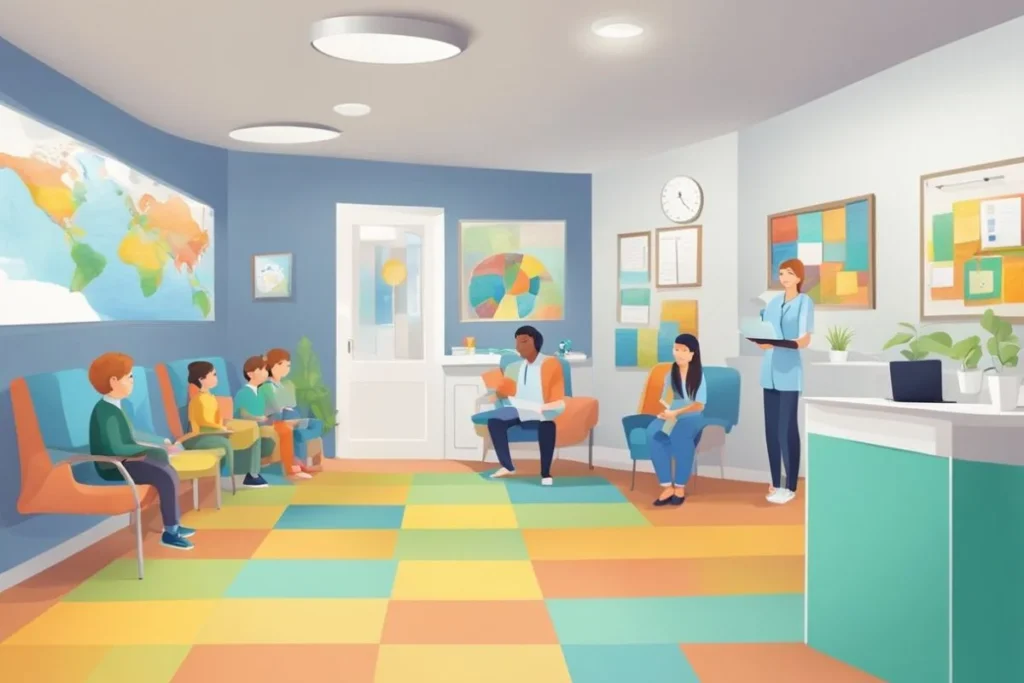When searching for the best autism diagnosis centers, it’s important to consider several criteria. These factors can help ensure that the center you choose has the expertise and resources necessary to provide accurate diagnoses and effective treatment plans. Here are some key criteria to keep in mind:
Certified Specialists
One of the most important factors to consider is the qualifications of the specialists who will be conducting the autism evaluations. Look for centers that employ board-certified physicians and psychologists with specialized training in autism spectrum disorders. These specialists should have experience conducting comprehensive assessments and developing individualized treatment plans.
Multidisciplinary Approach
Autism is a complex disorder that can affect many different areas of a person’s life. That’s why it’s important to choose a center that takes a multidisciplinary approach to diagnosis and treatment. This means that the center should have a team of professionals from different disciplines, such as psychology, speech therapy, occupational therapy, and behavioral therapy, working together to provide comprehensive care.
Evidence-Based Methods
Finally, it’s important to choose a center that uses evidence-based methods for diagnosis and treatment. This means that the center should use assessment tools and treatment approaches that are effective through rigorous scientific research. Look for centers that stay up-to-date with the latest research and use evidence-based methods to guide their practice.
By considering these criteria, you can find a top autism diagnosis center that provides the expertise, resources, and evidence-based care your loved one needs.
Regional Leaders in Autism Diagnosis
1. North America
North America has some of the best autism diagnosis centers in the world. One such center is the Center for Autism and Related Disorders (CARD), which has over 200 locations worldwide and is known for its evidence-based treatment programs. The Autism Treatment Center of America is another renowned center located in Massachusetts, which provides a range of services for individuals with autism, including diagnostic evaluations, parent training programs, and educational workshops.
2. Europe
Europe has several leading autism diagnosis centers, including the Autism Research Centre at the University of Cambridge, which is known for its research on the early identification and diagnosis of autism. The National Autistic Society Diagnostic Centre in the UK is another notable center that provides diagnostic assessments for children and adults with autism.
3. Asia
Asia has seen a rapid increase in autism diagnosis centers in recent years. The Shanghai Autism Research Center in China is one of the leading centers in Asia, providing diagnostic evaluations and treatment programs for individuals with autism. In Japan, the National Institute of Mental Health is a prominent center that conducts autism research and provides diagnostic assessments.
4. Australia
Australia has several leading autism diagnosis centers, including the Autism Association of Western Australia, which provides diagnostic evaluations, early intervention programs, and support services for individuals with autism and their families. The Olga Tennison Autism Research Centre at La Trobe University is another notable center that conducts autism research and provides diagnostic assessments.
Overall, these regional leaders in autism diagnosis provide invaluable services for individuals with autism and their families. With their evidence-based treatment programs and research efforts, they continue to make significant contributions to the field of autism research and treatment.
What to Expect During the Diagnostic Process
If you suspect that you or a loved one may have autism, it is important to seek out a professional evaluation. The diagnostic process can be overwhelming, but understanding what to expect can help ease anxiety and ensure a smooth experience.
Initial Consultation
The first step in the diagnostic process is typically an initial consultation. During this appointment, the diagnostician will gather information about the individual’s medical history, developmental milestones, and current symptoms. They may also ask about family history and any concerns the individual or their caregivers may have. This information will help the diagnostician determine the appropriate next steps in the evaluation process.
Comprehensive Evaluations
After the initial consultation, the diagnostician will conduct a comprehensive evaluation to assess for autism spectrum disorder (ASD). This evaluation may include a variety of assessments, such as standardized tests, observations, and interviews. The diagnostician may also consult with other healthcare professionals, such as a psychologist or speech therapist, to gather additional information.
Communication with Caregivers
Throughout the diagnostic process, caregivers need to be involved and informed. The diagnostician should communicate clearly and regularly with caregivers, providing updates on the evaluation process and results. Caregivers should also feel comfortable asking questions and expressing concerns.
Support Services Post-Diagnosis
After receiving an autism diagnosis, families may need additional support to help navigate the various treatment options available. Fortunately, there are many resources available to help families access the support they need.
Therapy and Intervention Options
One of the most important steps in managing autism is to find the right therapy and intervention options. This can include behavioral therapy, speech therapy, and occupational therapy. Many autism diagnosis centers offer these services in-house or can provide referrals to trusted providers in the community.
It’s important to work with a qualified therapist who has experience working with individuals with autism. The therapist should be able to identify the specific needs of the individual and tailor treatment accordingly.
Educational Support
Children with autism may require additional support in the classroom to help them succeed academically. Many autism diagnosis centers offer educational support services, such as tutoring and special education programs.
Parents should also be aware of their child’s rights under the Individuals with Disabilities Education Act (IDEA), which provides special education services for children with disabilities, including autism.
Community Resources
There are many community resources available to families of individuals with autism. These can include support groups, respite care, and recreational programs.
Families should also be aware of the resources available through national organizations such as Autism Speaks and the National Autism Association. These organizations offer a wealth of information on autism and can help connect families with local resources.
Navigating Insurance and Costs
Navigating insurance and costs can be a daunting task for parents seeking an autism diagnosis for their child. However, there are many resources available to help families with the financial burden of diagnosis and treatment.
Insurance Coverage
Most insurance plans cover autism diagnosis and treatment, but the extent of coverage varies widely. It is important to check with your insurance provider to understand what is covered under your plan. Some plans may have limits on the number of therapy sessions allowed per year, while others may not cover certain types of therapy.
In recent years, there has been a push for insurance providers to cover Applied Behavior Analysis (ABA) therapy, which is a common treatment for autism. According to Autism Speaks, at least 200 million people now have health insurance coverage for ABA due to advocacy efforts.
Financial Assistance Programs
For families who cannot afford the cost of diagnosis and treatment, there are financial assistance programs available. Non-profit organizations such as Autism Speaks and the Autism Society offer grants and scholarships to help cover the cost of therapy and other expenses related to autism.
In addition, some states offer financial assistance programs for families with children who have been diagnosed with autism. These programs may provide funding for therapy, respite care, and other services. It is important to research the programs available in your state to see if you qualify.
Advancements in Diagnostic Techniques
Autism Spectrum Disorder (ASD) is a complex neurodevelopmental condition that affects communication, social interaction, and behavior. Early diagnosis and intervention are crucial for improving outcomes for individuals with ASD. Over the years, there have been significant advancements in diagnostic techniques, which have enabled earlier and more accurate diagnosis of ASD.
Technological Innovations
Technological advancements have revolutionized the diagnosis of ASD. One such innovation is the use of eye-tracking technology to measure eye movements and gaze patterns. This technology has been used to identify subtle differences in the way children with ASD look at faces and other social stimuli, which can aid in early diagnosis.
Another technological innovation is the use of electroencephalography (EEG) to measure brain activity. EEG has been used to identify differences in brain activity between individuals with ASD and typically developing individuals. This technology has the potential to aid in the early diagnosis of ASD and also to monitor the effectiveness of interventions.
Research and Development
Research and development in the field of ASD diagnosis have led to the development of new screening tools and diagnostic criteria. The two main tools used in the diagnosis of ASD are the Diagnostic and Statistical Manual of Mental Disorders (DSM-5) and the Modified Checklist for Autism in Toddlers (M-CHAT). These tools examine persistent deficits in interaction and social communication, as well as restrictive and repetitive patterns of behavior.
In addition, there has been a growing emphasis on the importance of early detection and intervention. This has led to the development of new screening tools that can identify children at risk for ASD at an earlier age. Early intervention can help improve outcomes for individuals with ASD, making early detection crucial.
Conclusion
In conclusion, advancements in diagnostic techniques have led to earlier and more accurate diagnosis of ASD. Technological innovations such as eye-tracking and EEG have revolutionized the field of ASD diagnosis, while research and development have led to the development of new screening tools and diagnostic criteria. These advancements have the potential to improve outcomes for individuals with ASD, making early detection and intervention crucial.







